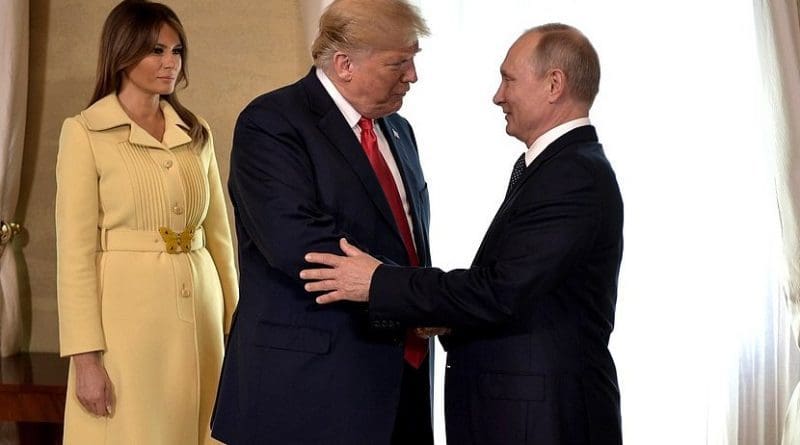Putin Invited To Washington For Fall Summit
By RFE RL
(RFE/RL) — White House spokeswoman Sarah Sanders has said that U.S. President Donald Trump has ordered officials to invite Russian President Vladimir Putin to Washington “in the fall.”
“President Trump asked [national security adviser John Bolton] to invite President Putin to Washington in the fall and those discussion are already underway,” Sanders wrote on Twitter on July 19.
Sanders also wrote that “in Helsinki, [Trump] agreed to ongoing working level dialogue between the two security council staffs.”
Earlier in the day, Trump hailed his recent summit with Putin as “a great success” and said he was looking forward to “our second meeting” to implement some of the ideas discussed in Helsinki.
Trump, in Twitter postings on July 19, also criticized the press for what he perceived as negative coverage of the meeting with the Russian leader.
“The Summit with Russia was a great success, except with the real enemy of the people, the Fake News Media,” he wrote.
“I look forward to our second meeting so that we can start implementing some of the many things discussed, including stopping terrorism, security for Israel, nuclear,” he added, also citing “proliferation, cyberattacks, trade, Ukraine, Middle East peace, North Korea, and more.”
“There are many answers, some easy and some hard, to these problems…but they can ALL be solved!”
There have been no other details about what agreements might have been reached. Speaking at a forum in Colorado on July 19, National Intelligence Director Dan Coats said, “I don’t know what happened at that meeting,” referring to the one-on-one session between the two presidents in Helsinki on July 16.
Putin also called the summit “successful overall” and claimed that it led to “some useful agreements,” without being specific.
He was quoted by AFP as saying in a Moscow speech that Trump’s critics in the United States were “pathetic, worthless people,” an apparent allusion to a quotation by Soviet satirists Ilya Ilf and Yevgeny Petrov.
Trump has faced sharp criticism from U.S. lawmakers — including key Republicans — and others who denounced his performance at a July 16 joint press conference with Putin following their Helsinki meeting.
Trump appeared to give credence to denials by Putin that Russia had interfered in the 2016 U.S. presidential election or was planning to do so in the future, despite the conclusions of U.S. intelligence and law enforcement agencies and congressional committees that Moscow intervened in the 2016 election with a state-directed campaign of hacking and public-opinion manipulation.
Many critics also complained that there was no record of agreements, if any, that were reached between the two during their one-on-one meeting.
During his presidential campaign and into his presidency, Trump has consistently said he seeks better relations with Russia and Putin in particular.
In his Twitter comments, Trump claimed that the “Fake News Media” was going “crazy” and that it wanted to see a “major confrontation” with Moscow, even one that could lead to war.
“They are pushing so recklessly hard and hate the fact that I’ll probably have a good relationship with Putin. We are doing MUCH better than any other country!”
Trump’s complaints also went against the European Union, taking issue with an announcement by the European Commission that it was fining Google a record 4.34 billion euros ($5 billion) for breaching EU competition rules by imposing illegal restrictions on Android smartphone makers and mobile network operators.
“I told you so! The European Union just slapped a Five Billion Dollar fine on one of our great companies, Google. They truly have taken advantage of the U.S., but not for long!”
Google said it will appeal the fine.
Trump’s remarks come ahead of a scheduled July 25 visit to Washington by European Commission President Jean-Claude Juncker to discuss “a wide range of priorities” with the U.S. president, including a “focus on improving transatlantic trade.”
The two leaders will also discuss foreign and security policy, counterterrorism, energy security, and economic growth.

